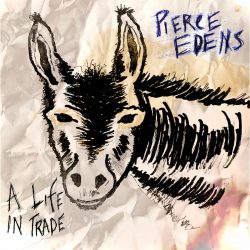Turmoil, rumination, peace and contemplation on pastoral yet spiky fifth record.
 ‘A Life In Trade’ is the fifth album from North Carolina musician and craftsman Pearce Edens. The album found its origins in Edens’ embrace of solitary rural living during the pandemic, finding purpose in the daily ritual of tending the land. A folkloric tale of payment in kind underpinned the recording process: in exchange for Edens’ carpentry skills, Mike Savino of Tall Tall Trees and Kishi Bashi offered up his recording and engineering talents. Sonically rustic and raw, the album fits the aesthetic of a sawdust-covered workshop, its door ajar revealing a chink of golden evening farmyard.
‘A Life In Trade’ is the fifth album from North Carolina musician and craftsman Pearce Edens. The album found its origins in Edens’ embrace of solitary rural living during the pandemic, finding purpose in the daily ritual of tending the land. A folkloric tale of payment in kind underpinned the recording process: in exchange for Edens’ carpentry skills, Mike Savino of Tall Tall Trees and Kishi Bashi offered up his recording and engineering talents. Sonically rustic and raw, the album fits the aesthetic of a sawdust-covered workshop, its door ajar revealing a chink of golden evening farmyard.
‘The Only Ones’ is an apt opener, laying bare the uncertainty, anguish and hope that binds together the album’s ten tracks. Rustling mandolins and acoustic guitar underlay contemplations of gloomy tendencies: “It’s easy feeling sad instead of feeling satisfied when your head and your heart are put together like mine are” Edens laments, yet finds hope in a woman who’s been “out wandering in the cracks between the days”. Despite the melancholy melody, the track has a sprightly, tentative openness.
‘Whisper in the Water’ is far more desolate – a cold sunset of a song, all descending fingerpicked acoustic chords and humming electric guitar patches. Front and foremost is Edens’ voice, honest and open and at times close to cracking as he evokes an empty, haunted loneliness: “Don’t wanna be that flicker in the mirror, that thing you saw dance out past the frame”; the sonic atmosphere is ghostly as well as disconsolate. Rising to a desperate trot, Edens almost wails the increasingly hopeless refrain of “I wanna be your sunbreak in the morning” as the song draws to a close. The halting garage-blues of ‘Lovely Bones’ doubles-down on the sadness of parting. Edens’ vocal embellishments, such as drawing out the ends of the words “pillow” and “alone”, thicken the mood, like heartbroken sobbing.
Two instrumental breaks split the album into thirds; the first instrumental takes the metaphorical sunbreak of ‘Whisper in the Water’ as its name, and recreates that track’s desolate soundscape; it marks a transition to a jauntier run of tracks: ‘Trouble’, ‘Near Misses’ and ‘I Want You’. More buoyant they may be, the lyrics still evoke a sense of turmoil, desperation, desire and strife, culminating in a fever-dream atmosphere in ‘I Want You’, preceding the pastoral acoustic guitar, mandolin and crickets of instrumental ‘All the Things I Love’.
On ‘Trouble’ Edens contemplates the state he’s in: tired, frustrated, stuck, his sense of belonging in a place he once called home seeping away, all over a bluesy country rhythm with mandolin interludes and bouncy acoustic strums. The squally electric guitar in the background as the song fades out is like a tantrum’s zenith.
‘I Want You’ is the album’s dark, burning heart – a song of lust and desire, it’s a slow-burning, stutteringly cathartic, almost grungy track. Rhythmic acoustic guitar and a shuddering drumbeat create a circular, spiralling atmosphere in which Edens’ stream-of-consciousness style lyrics are entrapped, as increasingly wild guitar solos whip up a storm over a chiming, Stooges-style pound. The song structure is like a passing panic, quietening to a cold sweat as it fades out.
Post- ‘All the Things I Love’, the album’s final part is a little calmer. ‘Two Pennies’ has a bare-bones opening with just vocals and a White Stripes-style stomping, garage drumbeat; in fact, the song isn’t unlike some of Jack White’s more country-blues oriented output, with tastefully deployed keys and harmonica. The lyrics deal with the conveyor of working, earning, paying and eventually dying, at which “we all pay two pennies to the ferryman”.
The album closes with a weaker track – a cover of “I Don’t Want to Live on the Moon” of Sesame Street fame. Perhaps it’s just that the cover doesn’t do much for someone who’s not particularly acquainted with the Sesame Street songbook, but it feels a bit of a lacklustre closer, with little build or development compared to some of the angsty, personal and heartfelt tracks earlier in the album.
Nonetheless, ‘A Life In Trade’ is a solid, well-structured album overall, with strong vocals and instrumentals hemmed by a roughness likely shaped by the rural environment in which the album was created and where Edens plies his trade. The isolated, pastoral setting of the album’s genesis is evident, as each song feels like a stage of personal reflection, an individual coming-to-terms with life’s hardships and patterns.


